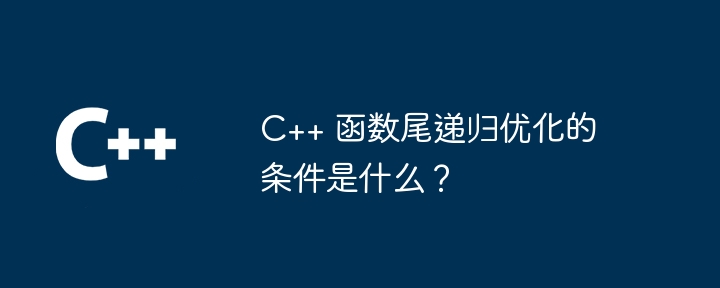
The conditions for tail recursive optimization (TCO) in C are as follows: the tail recursive call must be the last action of the function. A function's parameters and local variables must remain unchanged across tail-recursive calls. The compiler must support TCO. In a practical case, TCO is used to convert the tail recursive call of the factorial calculation function into a while loop, which improves performance.

Conditions for tail recursive optimization of C functions
Tail recursive optimization (TCO) is a compiler optimization technology that will Tail-recursive function calls are converted into jump instructions, thus avoiding the additional overhead of the function call stack.
In order for the tail recursive call of a function to be optimized by the compiler, the following conditions need to be met:
int factorial(int n) { if (n <= 1) { return 1; } else { return n * factorial(n - 1); // 尾递归调用 } }
int sum(int n) { int result = 0; if (n > 0) { result += n; // 局部变量 result 在尾递归调用中发生变化 return sum(n - 1); } else { return result; } }
Practical case
Consider the following function, which uses recursion to calculate the factorial:
int factorial(int n) { if (n == 0) { return 1; } else { return n * factorial(n - 1); } }
This function satisfies all conditions for tail-recursive optimization. We can use TCO to optimize this function and improve its performance.
int factorial(int n) { while (n > 0) { n = n * factorial(n - 1); // 转换为迭代 } return 1; }
After using TCO, the tail recursive call of the function is converted into a while loop. This eliminates the overhead of function calls and improves performance.
The above is the detailed content of What are the conditions for tail recursion optimization of C++ functions?. For more information, please follow other related articles on the PHP Chinese website!
 What are the differences between c++ and c language
What are the differences between c++ and c language Recommended learning order for c++ and python
Recommended learning order for c++ and python Cost-effectiveness analysis of learning python and c++
Cost-effectiveness analysis of learning python and c++ Is c language the same as c++?
Is c language the same as c++? Which is better to learn first, c language or c++?
Which is better to learn first, c language or c++? The difference and connection between c language and c++
The difference and connection between c language and c++ C++ software Chinese change tutorial
C++ software Chinese change tutorial Cost-effectiveness analysis of learning python, java and c++
Cost-effectiveness analysis of learning python, java and c++



